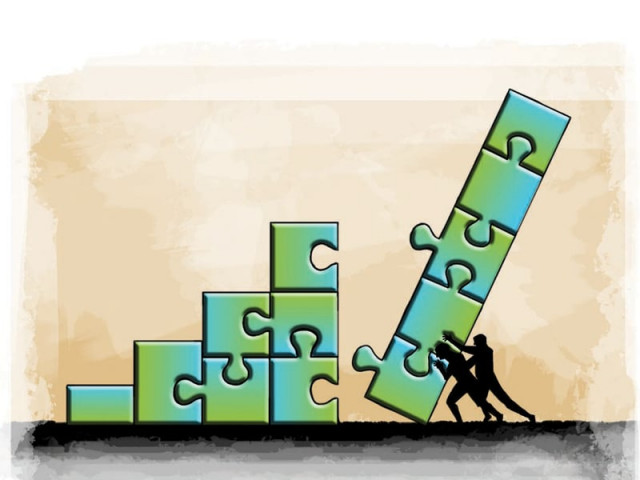Booming business: Industry recognition, awards and business
Pakistan should support and develop Islamic banking further.

Pakistan should support and develop Islamic banking further. ILLUSTRATION: JAMAL KHURSHID
There are numerous awards, prizes and accolades in business, politics, academia and society to recognise excellence and leadership roles played by individuals and institutions.
In addition, various indices, rankings and polls are used as performance indicators for a number of activities in different fields. From the Nobel Prize to Transparency International’s Corruption Index, all these recognitions and rankings summarise detailed information into composite numerical figures, providing easy-to-understand indicators to decision makers on a number of commercial, political and social issues.
Consumer price indices are another important indicator reflecting the state of affairs of an economy, particularly inflation.
The awards are storytellers. Dr Adnan Chilwan, CEO of Dubai Islamic Bank in UAE, stated in an interview after his bank was adjudged Best Islamic Bank of 2013 at the recently concluded Global Islamic Finance Awards (GIFA), “Every business has an interesting story to tell and the awards bring out such stories to the wider public.”

The same Global Islamic Finance Awards in Dubai also honoured Shaukat Aziz, former prime minister of Pakistan, with its top award – the Global Leadership in Islamic Finance Award. This award tells a story wider than the personal achievements of the recipient.
It shares a story of progress, development and success of Islamic banking in Pakistan. In the last decade, Islamic banking and finance became a significant activity from almost zero to covering 6% of the financial sector in the country. The momentum continued into the second decade of the present century, with Islamic banking now representing almost 10% of the banking industry.
While Meezan Bank, recipient of Best Research & Development Award at GIFA, has now emerged as a leading premier bank that also happens to be an Islamic bank in the country, there are some other untold stories of success.
For example, few people know that Bank Alfalah, a conventional bank, has the largest Islamic banking business in the country after Meezan Bank. It is certainly ahead of the likes of other Islamic banks, namely, Bank Islami Pakistan, Dubai Islamic Bank Pakistan, Albaraka Bank and Burj Bank.
It is interesting to note that Bank Islami Pakistan received the Shariah Authenticity Award from GIFA last year at its annual ceremony held in Kuala Lumpur. This recognition shows that amongst countries where Islamic banking is significant, Pakistan has arguably developed the most authentic Islamic banking model, fulfilling the strictest Islamic guidelines on commerce, trade and finance.
The general picture of Pakistan in the domestic and international media is one of gloom. Security concerns, economic problems and social unrest have hijacked televisions and newspapers, portraying a country deep in a mire of turmoil.
Certainly, there are problems and these need to be addressed and solved. But we have to balance the positive successes of the country with its problems in a neutral manner, and not in a way that is absolutist on the side of criticism.
Pakistan’s recognition as a leading player in the global Islamic financial services industry must be highlighted and exploited to the advantage of the country.
Sheikh Mohamed Bin Rashid Al Maktoum, Vice President of UAE and ruler of Dubai, has recently initiated a project to portray Dubai as a centre of excellence in the global Islamic economy. The government of Pakistan must build on the success of the Islamic banking sector in the country to promote it also as a centre of excellence for Islamic banking and finance.
Even some developed countries, most notably United Kingdom, are positioning themselves as friendly jurisdictions for Islamic banking and finance. At the recently held 9th World Islamic Economic Forum (WIEF) in London, British Prime Minister David Cameron announced the future issuance of a £200 million sovereign Sukuk, in an attempt to position his country as an active player in Islamic banking and finance.
Prime Minister Nawaz Sharif was also present at the WIEF, and one must hope that he will follow the tradition set up by his predecessors, like Shaukat Aziz, by continuing government support for Islamic banking in the country and develop it further for the benefit of the country and other wider stakeholders.
The writer is an economist and a PhD from Cambridge University
Published in The Express Tribune, December 2nd, 2013.
Like Business on Facebook, follow @TribuneBiz on Twitter to stay informed and join in the conversation.



















COMMENTS
Comments are moderated and generally will be posted if they are on-topic and not abusive.
For more information, please see our Comments FAQ